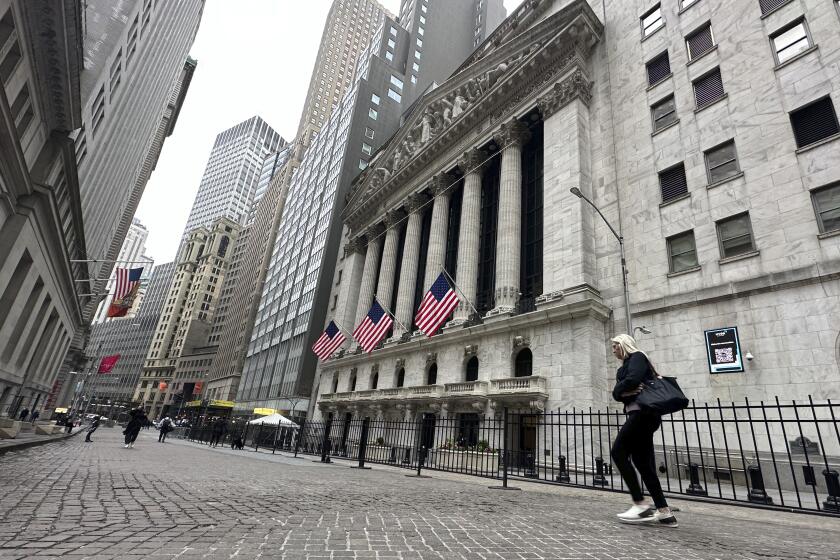Wall St. Wooing Hedge Funds
After the near-collapse of a giant hedge fund in 1998, Wall Street investment bank Citigroup Inc. scaled back its exposure to the freewheeling investment funds.
But as hedge funds exploded in popularity in recent years, Citigroup changed its thinking. Now, like the rest of Wall Street, it is aggressively courting hedge funds for their lucrative securities trades and other business.
“The way the firm approaches hedge funds has changed dramatically in the last two years,” said Tom Tesauro, managing director of global equity finance at Citigroup.
Just as investors are rushing toward hedge funds in search of oversized profits, so is traditional Wall Street. Hedge funds have become one of the fastest-growing sources of revenue for investment banks, generating about $25 billion in 2004, or more than one-eighth of the total, according to Credit Suisse First Boston.
Hedge funds turn out profits for brokerages in several ways. Their frenetic trading produces fat brokerage commissions -- an estimated 30% of total stock commissions, according to Sanford C. Bernstein & Co.
Fund managers also are eager buyers of derivatives, the complex investment concoctions whose value is based on factors such as the direction of interest rates or the prices of foreign currencies.
Citigroup and other investment banks sell derivatives to hedge funds and other clients at hefty profit margins.
“Hedge funds have become extremely important to the revenues and profits of Wall Street firms,” said Jim Melcher, a hedge fund manager at Balestra Capital Management in New York.
Hedge funds also have begun buying stakes in companies and pushing for them to be sold, generating work for the banks’ mergers and acquisitions units.
Investment banks service hedge funds through so-called prime brokerage units, which handle a variety of services including securities trades and helping funds find investors.
“A prime broker’s job is to handhold,” said Ali Hackett, who heads Citigroup’s prime brokerage unit with Tesauro.
The leading prime brokers are Goldman Sachs Group Inc., Morgan Stanley and Bear Stearns Cos.
Prime brokers can be highly profitable, with operating margins at top firms of 45% or more, according to Deutsche Bank. At Goldman Sachs, prime brokerage revenue surged to almost $1.8 billion in fiscal 2005, up from $1.3 billion in 2004 and $1 billion in 2003.
Prime brokerage units make the bulk of their profits by lending money to hedge funds to buy securities and by assembling blocks of stock that hedge funds want to sell short. A short sale is a bet that a stock will fall in value.
Citigroup was late to the prime brokerage business, launching its effort in the mid-1990s. Although the unit grew in the late 1990s, it was held back as the company overall cut back on trading and other forms of risk-taking after the 1998 Russian financial crisis and the near-collapse of hedge fund Long-Term Capital Management.
That thinking has changed in recent years as pension funds and other big investors have turned increasingly to hedge funds, and Citigroup is now pursuing them aggressively.
“In five or 10 years, there will be five or six big players in this market and we will be one of them,” Tesauro said.
Not surprisingly, competition among investment banks for hedge fund customers is intense.
At Santa Monica-based hedge fund Coast Asset Management, for example, unsolicited calls regularly pour in from investment bankers pitching their services.
A few years ago, “there weren’t a lot of banks willing to lend money to hedge funds,” said Tony Harrington, managing director at Coast. “Now they’re falling all over themselves to lend money to hedge funds.”
Although hedge funds have largely been positive for investment banks, there is some downside.
Many of the investment banks’ top people have jumped ship in recent years to join hedge funds or to start their own. And a few hedge funds are beginning to encroach on the investment banks’ turf by providing financing to companies or by making markets in certain securities.
The most immediate threat to banks, some experts say, is their headlong rush into so-called proprietary trading. This is a practice in which in-house traders make bets using the firms’ own money as opposed to simply facilitating trades for institutional customers.
Goldman Sachs has derived big profit from its proprietary trading in recent years, leading some to wonder whether it and others are taking too much risk.
Goldman Sachs doesn’t disclose proprietary-trading volumes, but a spokesman said it was less than outsiders assumed.
“Most of our trading is on behalf of clients rather than for our own account,” spokesman Peter Rose said.
As hedge funds expand, it’s likely that Wall Street’s reliance on them will grow in coming years.
“Wall Street is smart enough to understand that we have to pay attention to hedge funds,” Hackett said. “It’s getting mainstream.”






